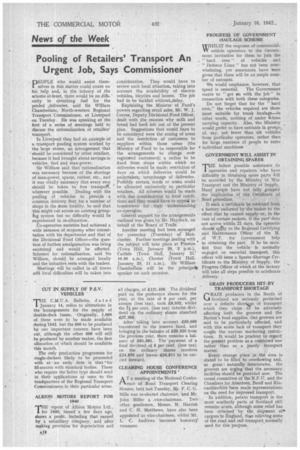Pooling of Retailers' Transport An Urgent Job, Says Commissioner
Page 20

If you've noticed an error in this article please click here to report it so we can fix it.
DEOPLE who would assist them
selves in this matter could count on his help and, in the infancy of .the scheme at•least, there would be no difficulty in obtaining fuel for the pooled ,deliveries, said Sir William Chamberlain, North-western Regional Transport Commissioner, at Liverpool on Tuesday. He was speaking at the first of a series of meetings held to discuss the rationalization of retailers' transport.
In Liverpool they had an example of a transport pooling system worked by the large stores, an arrangement that should be considered by other retailers, because it had brought about savings. in vehicles, fuel and man-power.
Sir William said that'rationalization was necessary because of the shortage of manrpower, spares, rubber, etc., and it was vitally necessary that every step should be taken to free transport, wherever possible. Dealing with the pooling of vehicles to provide a common delivery fleet for a number of shops in the a'aine locality, he said that this might cut across an existing group. frig system but no difficulty would be experienced in. re-allocation.
Co-operative societies had achieved a wide measure of economy after consultation with his department and that of the Divisional Food Officer—the question of further amalgamation was being examined and would be effected. Schemes for rationalization, said Sic William, should be arranged, locally and the initiative rests with the traders.
Meetings will be called in-all towns and local difficulties will be taken into consideration. They would have to review each local situation, taking into account the availability of electric vehicles, bicyoles and horses. The job had to be tackled withoutAelay.
Explaining the Minister of Food's powers regarding retail sales, Mr. W. J. Comes, Deputy Divisional Food Officer, dealt with the reasons why milk and bread had been left out of the present plan. Suggestions that would have to be considered were the zoning of areas and the restriction of customers to suppliers within those areas (the Ministry of Food to be responsible for the arrangements to change over registered customers); a radius to be fixed from shops within which no deliveries would be made; restriation of days on which deliveries would be undertaken; interchange of deliveries. Podsibly certain roads or areas could be allocated exclusively to partichlar retailers. All schemes would be 'made with due consideration to local conditions and they would have to appeal to housewives for :their understanding co-operation.
General support for the arrangements outlined was given by Mr. Haydock, on behalf of the Board of Trade.
Another meeting had been arranged • for yesterday (Thursday) at Manchester. Further meetings dealing with the subject will take place at Preston (Town Hall, January 20, 2 p.m.), Carlisle (Town Hall, January 21; 10.30 a.m.), Chester (Town Hall, January 23, 11 a.m.). Sir William Chamberlain will be the principal' speaker on each occasion.




















































